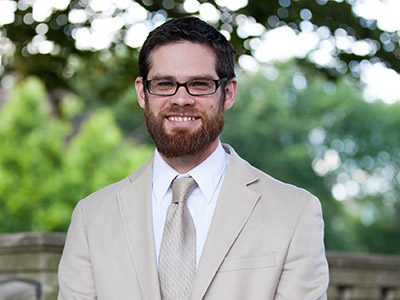When the time came for Tucker Ferda to leave his western-Montana home for college, he set his face eastward. “I enrolled at Bethel University in St. Paul, Minnesota, with a plan to major in history and become a high-school history teacher,” Tucker says, “but thanks to the New Testament scholar who taught my required introduction to the Bible course, I fell in love with that field.” So Tucker added a second major—biblical and theological studies.
“My college professors were the total package—good scholars, good teachers, and good mentors,” Tucker notes. “They inspired me to become that same kind of professor”—and toward that end, after college he pursued master’s and doctoral degrees focusing on the New Testament.
Tucker received his Ph.D. in 2016 from the University of Pittsburgh, but he’d started teaching at PTS several years earlier, while he was still a doctoral student. First, as an adjunct professor, he taught summer Greek. Then, since his research focuses on the life of Jesus, the Gospels, and the reception history of the New Testament, he began offering a variety of courses in those areas as well. Now, as the Seminary’s new visiting assistant professor of New Testament, he’s continuing to offer such courses and more.
“I love teaching biblical studies because I get to share my passion for these endlessly fascinating texts that are theologically formative as well as historically interesting,” says Tucker. His classes aim to expose students to the breadth and richness of New Testament scholarship, while also “preparing them for how they will encounter the Bible in their individual contexts.” In other words, he’s intent on finding ways to bridge the academic study of the Bible with everyday devotional and practical aspects of reading and teaching Scripture.
Tucker’s first book, which investigates how New Testament texts and later readers dealt with the rejection of Jesus, will be published later this year in T&T Clark/Bloomsbury’s prestigious Library of New Testament Studies series. His next book projects include a historical and exegetical study of the Second Coming tradition—a topic he notes is largely ignored in the study of Christian origins—and another on biblical literacy in the contemporary world. “The latter is geared for a general audience and is a kind of cultural exegesis of the context in which we find ourselves today—a context in which the Bible no longer forms the basis of our common cultural language. How does (and how should) our society’s overall biblical illiteracy affect the reading, interpretation, and teaching of the Bible? This question and others like it are the sorts of questions I aim to address,” Tucker says.
Dr. Tucker Ferda gives his readers and his students strategies both for thinking critically about the Bible and for implementing academic learning in the circumstances and situations encountered in daily life. In other words, he is today that true scholar-teacher-mentor his professors inspired him to become.

